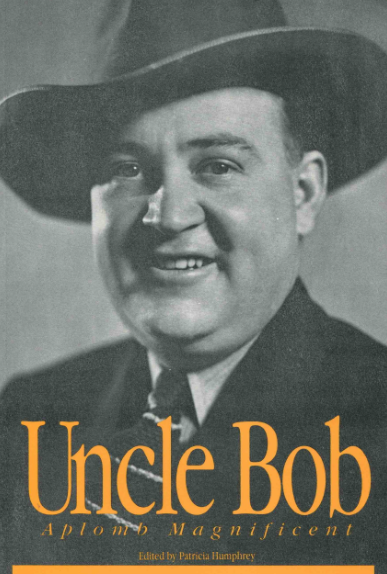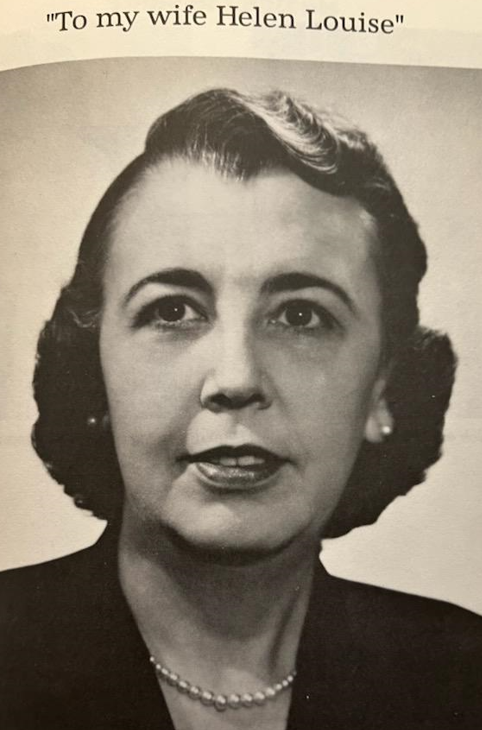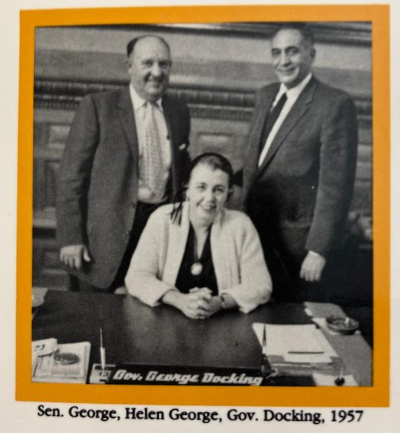Now there was a farmer forward-speaking serving politician like never before and likely never to be one comparable again.
He’s been gone sometime now, and most people don’t even recognize the name. His true life’s story needs to be told and the world be made aware.
An autobiography, “Uncle Bob: Aplomb Magnificent,” Robert Jennings George unveils a remarkable Coffey County, Lebo, Kansas, farm boy’s life story.
First to clarify, the book title is credited to William Allen White, world-renowned Emporia Gazette editor-editorialist.
Bob George married late in life and had no children. Yet he was very close to his family, lots of nieces and nephews; Bob was their uncle.

Aplomb is defined “self-confidence, especially when in a demanding situation, complete, confident composure, self-assurance, poise.” Obviously, Bob George was aplomb.
Magnificent: “elaborate, extravagant, striking, very good, excellent.” Certainly, Bob George was magnificent.
“The Kansas farm boy became a trailblazing most-respected influencer impacting world political leaders, government decisions while retaining humble rural philosophies.”
There are better, likely more completely appropriate honorably recognizing descriptions, but that was Bob George.
Book’s opening comments by this writer’s longtime mentor, William Allen White was more considerably more verbose.
His writing downscaled; Mr. White editorialized when Bob George entered the service. “Bob George is about the oldest man taken by the selective service being 36 years old. He will not be afraid to shove colonels and brigadiers aside, put his feet on the table and spit at a mark before taking over the war. More than that, Bob will get away with it.
“When the time comes, if this war (World War II) lasts as long as it seems to stretch ahead, we may see, at the end, Bob George running a carnival in the grand peace of democracy with the Emperor of Japan in one cage, Mussolini on a leash, rattling a tin cup, and Hitler in the street parade playing the calliope, singing ‘God Bless America’ into a hootnanny.”
Born at Lebo, Kansas, October 6, 1906, Bob George’s book was published in 1993, on his 86th birthday.
Bob George was the ninth child of Robert and Ellen Moss George. His dad passed away before Bob George knew him.
So, Bob George got his “raisin’” from his mother and two brothers and four sisters who survived infancy. Bob recognized, “I have often said I was raised by the community, with my mother being gone (due to property settlement dispute). My sisters and their friends took turns taking care of me.”
Called into every aspect of working a farm as soon as age-wise possible, Bob admitted it “wasn’t easy life.” Like many families of the era, they lived on the farm during the summer and in town during school term. Often in different houses.
Never shy, Bob George was an “unspoken” spokesman from early one-room school days throughout his lifetime. Impossible to relay all the vast memories Bob related about his upbringing with many nearly incomprehensible youthful life transitions,
He attended both high school and college at Emporia always working to pay his own way. Unsuccessful athletically, Bob George was closely affiliated with top athletes and coaches as teams’ manager.

Forever a leader more than a follower, always straight forward to do what was right, Bob had run-ins with administrators. Emporia’s educational facilities today must still be credited to Bob George’s efforts. Come to find out, Bob was also influencer of major college athletic facilities at Manhattan and Lawrence.
His speaking ability was enhanced touring the United States on the Chautauqua circuit delivering entertainment and culture for all communities. President Theodore Roosevelt said, “Chautauqua is the most American thing in America.”
An enthusiastic promoter whatever the endeavor, Bob George was always closely tied to all forms of media. He developed print publications working every area of operations, while always closely collaborating with editors and airwaves personnel nationwide.
A leader in politics from grade school days throughout his life, Bob George was the staunchest Democrat starting in 1912. In 1924, he attended his first National Democratic Convention, forward serving diverse leadership capacities for the Democratic National Committee.
He was instrumental in campaigns for and against leaders from local through national levels. Bob George was personally acquainted with (only some from a long list) in his prejudicial order.
First Lady Eleanor Roosevelt, President Franklin D. Roosevelt, Vice presidents Henry Wallace, Hubert Humphrey, Adlai Stevenson, Al Gore Jr., Alben Barkley, Secretary of Agriculture Claude Wickard; Kansas governors Harry Woodring and Walter Huxman.
“Of course, William Jennings Bryan, after who I was named and with whom I spent time on the Chautauqua circuit.”
Bob George clarified: “Liberalism is not necessarily confined to Democrats. There have been many liberal progressive Republicans as well including William Allen White, and in his later years, Alf Landon as well as his daughter, Nancy Landon Kassebaum.”
Always maintaining Coffey County farming operations supporting his service career, Bob George turned down political payments.
He worked closely with the United States Department of Agriculture initiating farm programs. At the request of Eleanor Roosevelt, Bob George worked with the Farm Security Administration during the depression years in the Dakotas.
On Bob George’s revered acquaintance list as would logically be expected Williams Allen White. A story within Bob George’s autobiography was repeated by relatives and acquaintances. Among those were nephew George Wingert, Ottawa, and auctioneer-realtor Dave Webb, Stilwell, both former state representatives.
“I met Eleanor Roosevelt, the wife of the president of the United States, 1937, at the train. She shows up with a handbag and a little duffel overnight bag.
“Mrs. Roosevelt made the deal that we had to stop, have dinner, and meet William Allen White, a good friend at Emporia. We were there at 7 o’clock in the evening when the visit began.
“I’d been on the couch, took a nice nap, woke up, and they were still going at 2 o’clock in the morning. White was a talker, and Eleanor was not bashful. I told Eleanor, if we don’t get back down there to the hotel in time, we won’t have time to get up and eat.”
Thirty-six-years old, Bob George joined the Army serving during World War II. Not on the front line, he worked throughout the mainland in fundraising and support programs. Following the Army, he became active in the American Legion.
Bob George developed purebred Hereford cattle operations emphasis rather than cropland farming. He was co-ownerof a major league baseball team and also worked buying and selling municipal and school bonds.

In January 1949, Bob George was “sworn in as a Democratic senator in the state of Kansas,” serving through 1952. The Kerr-McGee Oil Company selected Bob George in 1956 as their realtor in California and New Mexico.
“I have been privileged to have met and conversed with many great people,” Bob George said. “It’s a privilege that many people have not been able to enjoy.”
Bob George married Helen Louise Gill on February 6, 1957. “Some things are worth waiting for,” according to their own stories. “We had a lot of fun while we were waiting.” Helen was the former Junior Democratic National Committee Woman from Kansas.
Last portion of Bob George’s book was written by Helen relating their many travels and visits with close friends.
“It seems that on every occasion that I saw Uncle Bob, he would remind me that I once told him I was going to go to Australia and shear sheep,” commented great nephew pastor George Robert Pasley. “I think Uncle Bob was anxious for me to go, so he could come and visit with me there.”
“Margaret Truman called Bob George a wealthy Kansas cattleman. But we called him Uncle Bob, and it was the greatest name of all,” Pasley said.
Bob and Helen developed and operated orange groves in Florida 24 years before retiring to Lakeview Village, Lenexa, in 1981.
Forever forethinking entrepreneurs, the couple opened a co-op grocery at Lakeview Village. In his honor, the community named it “Uncle Bob’s Pantry.”
Helen George noted visiting the “homeplace,” now operated by Bob George’s nephew Phil George, 101, and great nephew Jay George.
In his “A Final Word” chapter, Bob George said, “With less than 50 percent of the eligible electorate voting in 1988, possibly because they were not able to vote for ‘none of the above,’ our country is in bad shape.”
Bob George, 93, died February 12, 2000, and Helen passed away three years later.
Memorial services were at the Lebo United Methodist Church. George Robert Pasley recited an original committal poem:
UNCLE BOB
Uncle Bob never
simply told a story-
he made them dance,
he made them stand and shout,
he made us laugh
from the joy that quivered
in his telling.
Uncle Bob, in fact,
never did anything
“simply.”
So how can we
simply leave him here,
the wind blowing over his stone,
and say the story is done?
We cannot,
for his joy still quivers in our souls,
and the angels laugh
in heaven.